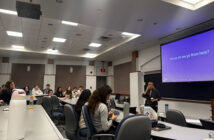
Sam Topp
Tomorrow will be better.
I have started saying this phrase to myself when life seems too hard and it seems like there is no way out. It might be some self-motivational crap that doesn’t seem to help at all, and it is a phrase I’ve never been too fond of using. But it provides the smallest amount of positivity to awful days that keep getting worse.
Sometimes you need to find the smallest things to help you get through major depression.
I was diagnosed with depression in summer 2015. It is strange to hear that what I feel is not normal. I then had a realization that this disease I had only ever heard about was now a part of my life. Since then, it’s been a constant struggle to get through the daily challenges of college while fighting myself along the way.
Depression among college students is more common than people might think.
According to Healthline, 44 percent of college students report having one or more symptoms of depression. This can be caused by any number or combination of factors such as stress, financial problems and relationships. The real issue is that 75 percent of college students don’t seek out help when they begin noticing these symptoms.
There is a stigma regarding mental illness. It is completely normal to talk about any physical ailment that pops up, but mental problems are treated with a sort of silence. It might have something to do with being open about such an internal concept because mental illness is incredibly hard to understand without actually having it.
I certainly feel uncomfortable talking about my depression, even to my closest friends. I worry that I will be treated differently, as if the problems I deal with daily become the basis of my identity. A sort of catch-22 occurs. I don’t want to talk about my problems — whether because of insecurities or guilt — which makes them worse, but the only way to escape the problems is to talk about them.
This shouldn’t be the case. Suppressing these thoughts and feelings can lead to much worse depression and in some cases suicide.
Suicide is unfortunately becoming more common among college students. The University of Pennsylvania had 10 student suicides in three years, placing second on a list of the most stressful universities according to CollegeDegreeSearch.net. Lehigh places 49th. A report of the National Data on Campus Suicide and Depression said the suicide rate peaks at ages 20-24, and one in 12 students makes a suicide plan. One percent of students actually go through with an attempt.
The hardest part of working to overcome depression is taking the first step toward seeking help. It took me three months to convince myself I needed to reach out and see someone, and looking back I should have ignored all of the thoughts that I didn’t need it. Seek out help whether you believe you need it or not. There’s no harm in trying.
Luckily, Lehigh’s clinical director of counseling services, Aaron Sterba, said more students have been taking advantage of on-campus counseling. While personal counseling is available, group sessions of 6 to ten students also meet once a week as an opportunity to share experiences and thoughts in a safe place.
“Some students come in for a few session and feel like they got the help they needed,” Sterba said. “Some attend group sessions for their four years at Lehigh.”
College, as contradictory as it may seem, is one of the best times in your life to seek out help. Counseling is free, and there are multiple therapists to talk to when it seems like there’s no one else. There will never be a time when more support will be available around you, whether that support is friends, family, professors, or teammates. The hardest part is taking those first steps and allowing yourself to know this is not the way to live.
“Besides,” Sterba said, “what have you got to lose in trying?”
There are times when it will be too hard to even get out of bed, too hard to be around people, too hard to perform basic tasks. Don’t let this define who you are. Remember, for all the late nights spent staring at the ceiling, for all the stress and the worry, you are not alone. Your illness is not your identity.
Tomorrow will be better.
—
Sam Topp, ’18, is an assistant news editor for The Brown and White. He can be reached at sjt213@lehigh.edu.





Comment policy
Comments posted to The Brown and White website are reviewed by a moderator before being approved. Incendiary speech or harassing language, including comments targeted at individuals, may be deemed unacceptable and not published. Spam and other soliciting will also be declined.
The Brown and White also reserves the right to not publish entirely anonymous comments.